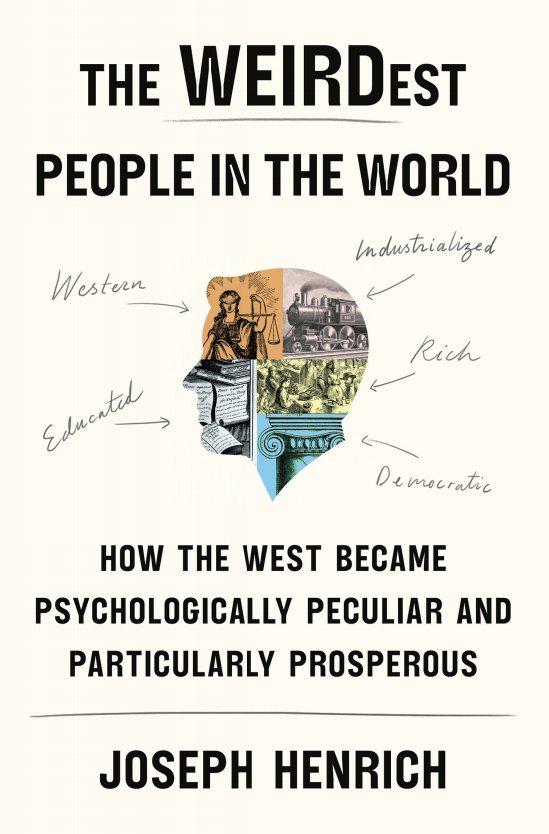Purzycki, Benjamin Grant, Martin Lang, Joseph Henrich, and Ara Norenzayan. “
The Evolution of Religion and Morality Project: Reflections and Looking Ahead.”
Religion, Brain & Behavior 12, no. 1-2 (2022): 190-211.
Publisher's Version Purzycki, Benjamin Grant, Martin Lang, Joseph Henrich, and Ara Norenzayan. “
Guiding the Evolution of the Evolutionary Sciences of Religion: A Discussion.”
Religion, Brain & Behavior 12, no. 1-2 (2022): 226-232.
Publisher's Version Vardy, T., C. Moya, C. Placek, C. D. Apicella, A. Bolyanatz, E. Cohen, C. Handley, et al. “
The religiosity gender gap in 14 diverse societies.”
Religion, Brain & Behavior 12, no. 1-2 (2022): 18-37.
Publisher's Version Baimel, A., C. L. Apicella, Q. Atkinson, A. Bolyanatz, E. Cohen, C. Handley, J. Henrich, et al. “
Material insecurity predicts greater commitment to moralistic and less commitment to local deities: A cross-cultural investigation.”
Religion, Brain & Behavior 12, no. 1-2 (2022): 4-17.
Publisher's VersionAbstract
The existential security hypothesis predicts that in the absence of more successful secular institutions, people will be attracted to religion when they are materially insecure. Most assessments, however, employ data sampled at a state-level with a focus on world religions. Using individual-level data collected in societies of varied community sizes with diverse religious traditions including animism, shamanism, polytheism, and monotheism, we conducted a systematic cross-cultural test (N = 1820; 14 societies) of the relationship between material insecurity (indexed by food insecurity) and religious commitment (indexed by both beliefs and practices). Moreover, we examined the relationship between material security and individuals’ commitment to two types of deities (moralistic and local), thus providing the first simultaneous test of the existential security hypothesis across co-existing traditions. Our results indicate that while material insecurity is associated with greater commitment to moralistic deities, it predicts less commitment to local deity traditions.
 PDF
PDF Zeng, Tian Chen, Joey T. Cheng, and Joseph Henrich. “
Dominance in Humans.”
Philosophical Transactions of the Royal Society B 377, no. 1845 (2022).
Publisher's VersionAbstractDominance is the aspect of social hierarchy that arises from agonistic interactions involving actual aggression or threats and intimidation. Accumulating evidence points to its importance in humans and its separation from prestige–an alternate mechanism in which status arises from competence or benefit-generation ability. In this review, we first provide an overview of the theoretical underpinnings of dominance as a concept, as well as some complications regarding the application of this concept to humans, which often shade into arguments that minimise its importance as a determinant of social influence in our species. We then review empirical evidence for its continued importance in human groups, including the effects of dominance rank on measurable outcomes such as social influence and reproductive fitness (independently of prestige), evidence for a specialized dominance psychology, and evidence for gender-specific effects. Finally, because human-specific factors such as norms and coalitions may place bounds on purely coercive status-attainment strategies, we end by considering key situations and contexts that increase the likelihood for dominance status to coexist alongside prestige status within the same individual, including how: 1) institutional power and authority tend to elicit dominance; 2) dominance-enhancing traits can at times generate benefits for others (prestige), and 3) certain dominance cues and ethology may lead to mis-attributions of prestige.
 PDF
PDF Purzycki, Benjamin Grant, Aiyana K. Willard, Eva Kundtová Klocová, Coren Apicella, Quentin Atkinson, Alexander Bolyanatz, Emma Cohen, et al. “
The Moralization Bias of Gods' Minds: A Cross-Cultural Test.”
Religion, Brain & Behavior 12, no. 1-2 (2022): 38-60.
Publisher's VersionAbstractThere are compelling reasons to expect that cognitively representing any active, powerful deity motivates cooperative behavior. One mechanism underlying this association could be a cognitive bias toward generally attributing moral concern to anthropomorphic agents. If humans cognitively represent the minds of deities and humans in the same way, and if human agents are generally conceptualized as having moral concern, a broad tendency to attribute moral concern—a “moralization bias”—to supernatural deities follows. Using data from 2,228 individuals in 15 different field sites, we test for the existence of such a bias. We find that people are indeed more likely than chance to indicate that local deities are concerned with punishing theft, murder, and deceit. This effect is stable even after holding constant the effects of beliefs about explicitly moralistic deities. Additionally, we take a close look at data collected among Hadza foragers and find two of their deities to be morally interested. There is no evidence to suggest that this effect is due to direct missionary contact. We posit that the “moralization bias of gods’ minds” is part of a widespread but variable religious phenotype, and a candidate mechanism that contributes to the well-recognized association between religion and cooperation.
 PDF
PDF Supplement
Supplement 